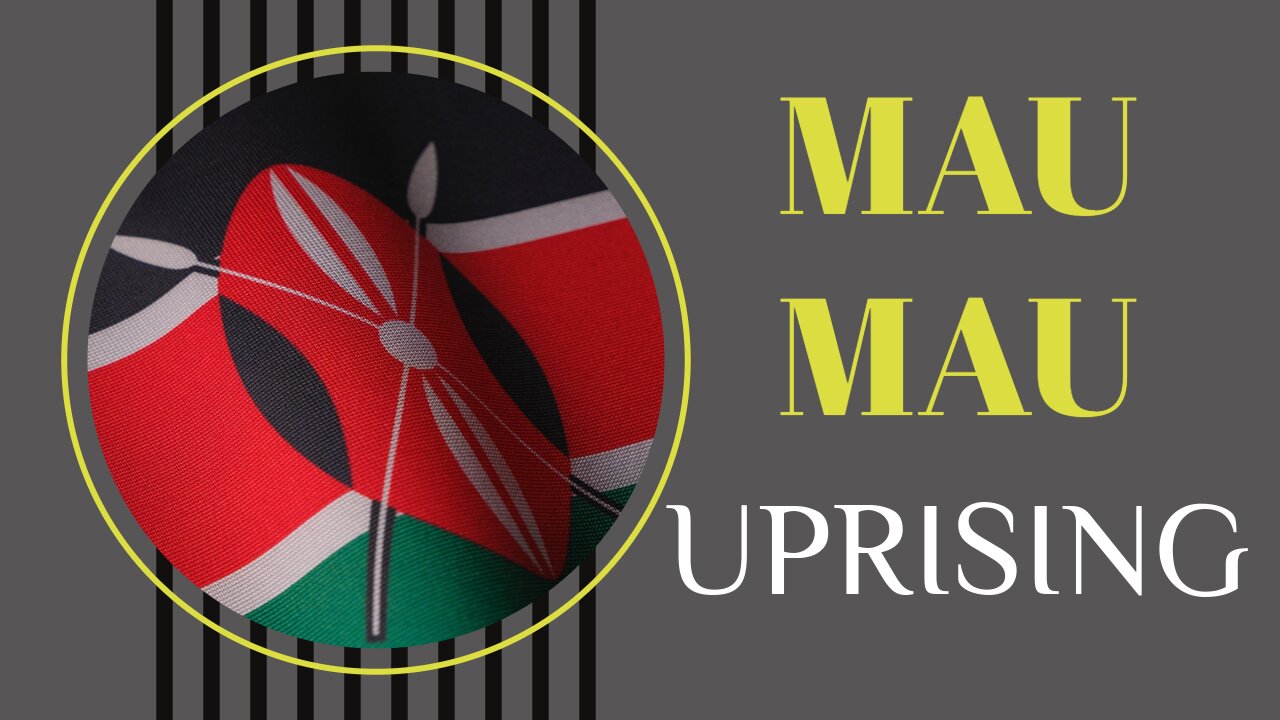Premium Only Content

The Mau Mau Uprising: Kenya's Struggle for Independence
The Mau Mau Uprising, also known as the Mau Mau Rebellion or simply Mau Mau, was a significant armed resistance movement that took place in Kenya during the 1950s.
The seeds of discontent were sown in the early 20th century when the British arrived in Kenya, seeking fertile land for European settlers. The indigenous people were displaced from their ancestral lands, resulting in a loss of cultural identity and economic stability.
The divide between the settlers and the Africans grew wider as the British government enacted policies favoring the minority white population and marginalizing the African majority. By the 1940s, the Kikuyu, who comprised the largest ethnic group in Kenya, had started organizing themselves to challenge the British rule.
The uprising officially began in 1952 when the Mau Mau fighters launched coordinated attacks against British officials, settlers, and loyalist Kikuyu members who opposed their cause. The rebels' tactics included sabotage, raids on settlements, and acts of violence. They were particularly effective at using guerrilla warfare, taking advantage of Kenya's dense forests and mountainous terrain, making it difficult for the British security forces to track them down.
In response, the British authorities declared a state of emergency, and troops were dispatched to quell the rebellion. The colonial administration launched a harsh crackdown on suspected Mau Mau sympathizers, leading to widespread arrests, detentions, and extrajudicial killings.
The violence and brutality on both sides escalated, resulting in a cycle of retribution and vengeance. Despite the heavy-handed response by the British authorities, the Mau Mau movement gained popular support among the African population, who saw it as a symbol of resistance against colonial oppression.
In 1960, the British government conceded to pressure and initiated talks with African leaders, leading to the Lancaster House Conference in London. These negotiations paved the way for Kenya's independence, which was achieved on December 12, 1963.
The Mau Mau Uprising was a watershed moment in Kenya's history, marking the end of British colonial rule and the beginning of a new era of self-determination.
Photo credits - JayRiley254, Dr Stima, Jerome KL, Rotsee2 @wikicommons Royal Prince Media, Kureng Workx, Engin Akyurt, Antony Trivet @ pexels.com
-
 LIVE
LIVE
Jerry After Dark
11 hours agoHole In One Challenge | Presented by TGL
7,268 watching -
 LIVE
LIVE
Alex Zedra
3 hours agoLIVE! New Game | The Escape: Together
1,338 watching -
 LIVE
LIVE
FreshandFit
4 hours agoJoe Budden Arrested For Being A Perv! Tesla Cybertruck Explosion
6,585 watching -
 2:08:45
2:08:45
Kim Iversen
6 hours agoNew Year, New PSYOP?: The Fort Bragg Connection In The New Years Terror Attacks
46.6K86 -
 1:41:18
1:41:18
Glenn Greenwald
6 hours agoTerror Attacks Exploited To Push Unrelated Narratives; Facing Imminent Firing Squad, Liz Cheney Awarded Presidential Medal | SYSTEM UPDATE #381
74.4K85 -
 1:00:32
1:00:32
Man in America
8 hours ago🔴 LIVE: Terror Attacks or False Flags? IT DOESN'T ADD UP!!!
22.7K2 -
 1:02:38
1:02:38
Donald Trump Jr.
10 hours agoNew Year’s Terror, Latest Breaking News with Sebastian Gorka | TRIGGERED Ep.204
160K298 -
 59:59
59:59
The StoneZONE with Roger Stone
5 hours agoAfter Years of Targeting Trump, FBI and DOJ are Unprepared to Stop Terror Attacks | The StoneZONE
38.3K7 -
 1:26:42
1:26:42
Leonardaisfunny
3 hours ago $2.27 earnedH-1b Visas: Infinity Indians
23.3K18 -
 1:08:33
1:08:33
Josh Pate's College Football Show
8 hours ago $1.39 earnedPlayoff Reaction Special: Ohio State Owns Oregon | Texas Survives | UGA vs Notre Dame Takeaways
25.2K4